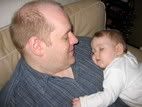Update.....
I attempted to read The Historian by Elizabeth Kostova but gave up as my memory problems were making it somewhat arduous. However, I will go back to it in the future as I did enjoy the parts i can remember (it's a sort of vampire/ historic novel, I suspect with a twist in it somewhere beyond where I read up to!).
I did manage The Last Legion by Valerio Massimio Manfredi which I thoroughly enjoyed; in fact I've ordered another of his novels from the library! The story is of the young Emperor Romulus Augustus fleeing the Empire under the protection of a grizzled veteran legionnaire and an aged druid from Britannia.... it gives a different spin to the Arthurian legend which was interesting. But the novels great strength lies in the ease with which the author evokes the Roman world. He uses few words to paint vivid pictures; he depicts the minutiae of working life in the ancient world with an ease and confidence which feels almost documentary rather than fiction. I later discovered that Manfredi is an Italian Professor of History and Archaeology - so it's hardly surprising his knowledge of Roman life is so impressive! That said what I absolutely enjoyed the most about this book was the following, taken from the acknowledgements:
"....and to Giancarla at Freccia's Bar, whose matchless espresso always starts my day off right."
The bulk of my reading time has been occupied trolling through Terry Brooks' Shannara Chronicles. This huge slab of epic fantasy managed to slip under my radar in my youth, so I thought I would catch up on it now. It's not too taxing (!) and is hugely formulaic, which really helps with my poor memory - I can guess what I've forgotten! The stories are moderately engaging and, although two-dimensional, you know what you're getting with the characters which is comforting. So far I've waded through 5 of the books and have 2 to go (I knw there are later ones as well but frankly I've nearly had enough), so the end is in sight!
I'm sure I've reaad other stuff as well but I can't remember what!
Labels: elizabeth kostova, fantasy, history, terry brooks, terry pratchett, valerio massimo manfredi, vampires
